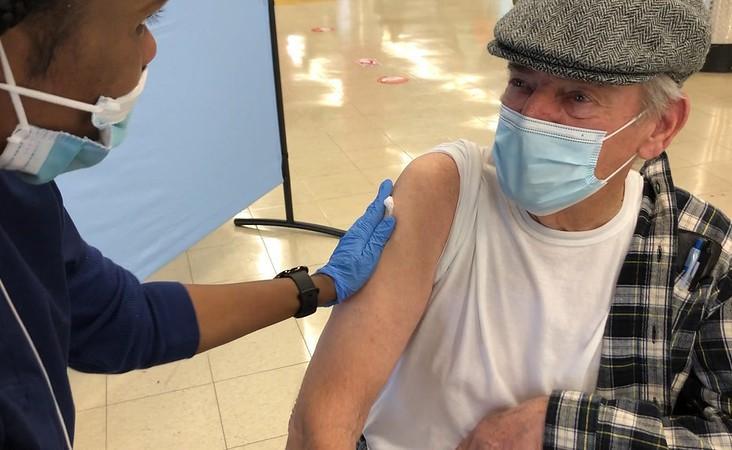Both the Pfizer/BioNTech and AstraZeneca/Oxford University COVID-19 vaccines significantly reduce severe illness, hospitalization, and death in older adults and offer protection against the B117 variant, suggests a real-world, observational, non–peer-reviewed study from the United Kingdom.
The study, led by researchers from Public Health England (PHE) and published yesterday on a preprint server, compared the rate of vaccination in symptomatic people older than 70 who tested positive for coronavirus with that of those who weren't vaccinated from Dec 8, 2020, to Feb 19, 2021. A total of 44,590 participants with available vaccination data tested positive for COVID-19, while 112,340 tested negative.
The investigators found that one dose of the Pfizer vaccine was 57% to 61% effective in preventing symptomatic COVID-19 after 4 weeks and that the AstraZeneca vaccine was 60% to 73% effective.
Two doses of the Pfizer vaccine were about 85% to 90% effective against symptomatic illness. It is too early to assess the effect of two doses of the AstraZeneca vaccine because second doses haven't yet been offered in England, the researchers said.
No drop in protection against B117
In participants 70 and older, a single dose of the Pfizer vaccine conferred 61% (95% confidence interval [CI], 51% to 69%) protection against COVID-19 infection at 28 to 34 days, after which it plateaued. The AstraZeneca vaccine's effects were observed 14 to 20 days after receipt, reaching 60% effectiveness (95% CI, 41% to 73%) at 28 to 34 days and then rising to 73% (95% CI, 27% to 90%) at 42 days.
Adults 70 years and older also had a 43% (95% CI, 33% to 52%) lower risk of hospitalization and a 51% (95% CI, 37% to 62%) lower risk of death after a single dose of the Pfizer vaccine. Those who received one dose of the AstraZeneca vaccine had a 37% (95% CI, 3% to 59%) lower risk of hospitalization, but follow-up data on deaths was incomplete because this vaccine was deployed later than the Pfizer vaccine.
Combining their effectiveness against symptomatic illness suggests that one dose of either vaccine is roughly 80% effective at preventing hospital admission and that the Pfizer vaccine is 85% protective against COVID-19 death, the authors said.
An analysis of vaccine effectiveness against the more virulent B117 coronavirus variant first detected (and now dominant) in England showed that both vaccines offered similar protection compared to other strains.
In adults 80 and older, vaccine effects were observed 10 to 13 days after receiving one dose of the Pfizer vaccine, achieving 70% efficacy (95% CI, 59% to 78%) against symptomatic infection at 28 to 34 days and then leveling off. Fourteen days after a second dose, effectiveness rose to 89% (95% CI, 85% to 93%).
When comparing the rate of hospital admission in COVID-19 patients aged 80 and older who were vaccinated versus those not vaccinated, a single dose of either vaccine was 80% or more effective at preventing hospitalization 3 or 4 weeks after the shot.
And compared with unvaccinated patients, adults 80 and older who received one dose of the Pfizer vaccine appeared to have an 83% lower chance of dying of COVID-19.
Continued research, vigilance needed
"The fact that the vaccine appears to be preventing symptomatic disease, including with the new variant of concern, is encouraging and this is likely to have a significant impact on case detections and severe outcomes at a population level," the researchers wrote.
Study coauthor Mary Ramsay, MD, PHE's head of immunization, said in a PHE news release that more research is still needed. "While there remains much more data to follow, this is encouraging and we are increasingly confident that vaccines are making a real difference," she said.
Because significant numbers of those vaccinated go on to become infected with coronavirus and may spread it, vaccinated people must remain vigilant, especially in the first 2 or 3 weeks, the authors said. "It is important to remember that protection is not complete and we don’t yet know how much these vaccines will reduce the risk of you passing COVID-19 onto others," Ramsay said. "Even if you have been vaccinated, it is really important that you continue to act like you have the virus, practise good hand hygiene, and stay at home."
The high efficacy achieved after one dose of vaccine motivated the United Kingdom to offer only one dose to as many people as possible before offering second doses, to maximize coverage. The researchers said that their findings support this strategy.




















